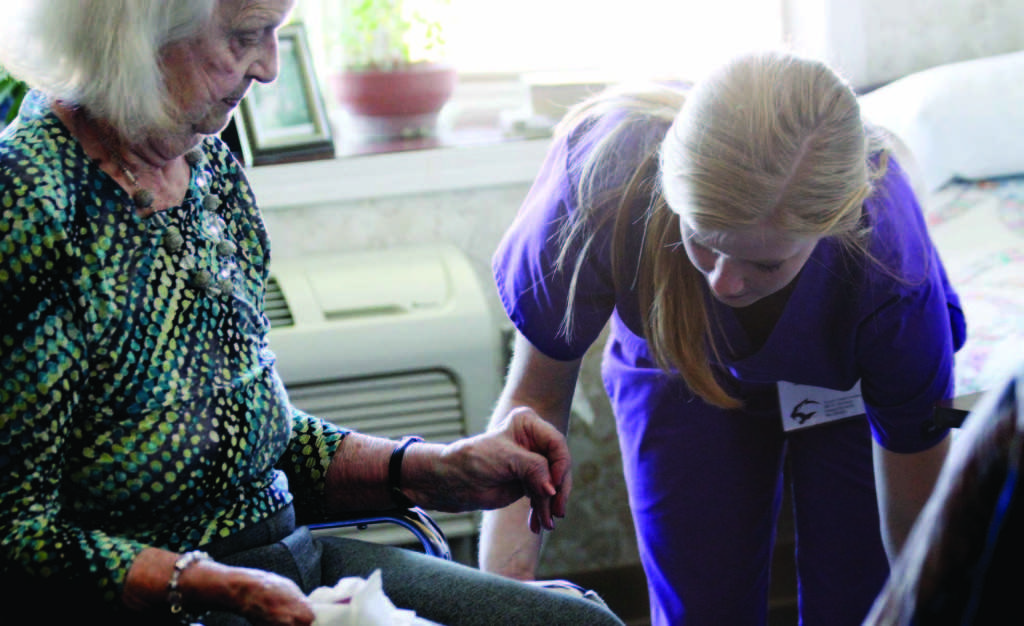
Helping a woman into her wheelchair, senior Lillie Huckaby works to earn her hours to receive CNA certification. Photo by Courtney Cooper
By Brooke Braman
When asked what “CNA” means, some students may respond with “curdled nectarine association” or “chronic neck arthritis.”
A special group of students, however, knows that “CNA” stands for “certified nursing assistant” because these individuals are working to earn their CNA certifications this school year.
“A certified nursing assistant is a person who works under the direct supervision of a nurse or a licensed practical nurse,” said Jennifer Hare, the medical pathway teacher. “They just help out. They perform the tasks assigned to them by those nurses.”
CNAs, who annually earn about $26,000, are state-certified medical professionals who care for patients under the direction of a registered nurse.
Though CNAs are not permitted to administer medication, they often carry out duties, like taking patient vital signs and assisting patients with daily hygiene routines. The U.S. Department of Labor cites certified nursing, as well as most healthcare careers, as a rapidly expanding field.
The chance for Kansas high school students to earn CNA certification resulted from a recently passed piece of state legislation: Senate Bill 155.
“Gov. Brownback was looking around the state and realized that there were a lot of high need jobs not being filled,” Hare said. “We have a huge aging population in Kansas and they all need care, specifically geriatric care. Gov. Brownback signed into law Senate Bill 155 that says the state of Kansas will reimburse school districts with students who get their CNA certificates.”
For many students, though, this bill is not just a piece of legislation. It’s an opportunity. The bill allows high school students to take classes in and earn certification for a variety of technical careers.
During the summer when this law went into action, the school district developed new partnerships with area community colleges to provide CNA training at reduced tuition. High school students from both LHS and FSHS applied for training programs at the community colleges, then complete the college course.
Currently, the CNA class provided by Neosho Community College meets off-campus on Tuesday and Thursday nights. Students also perform out-of-class hours as a part of the work force. At the end of the course, students are required to take an exit exam before certification is earned.
“Students have to go through a CNA program like they would at any community college,” Hare said. “They don’t get credit here or are evaluated here. It is a college course… Half of the program is classroom hours and half of the program is practical hours, helping out at Pioneer Ridge, for example. They learn the skills in the classroom then practice those skills in the field. After completing the program they have to take a certification exam.”
Because this CNA course is worth no credit and occurs during after-school hours, some students may think participation in this program would be a burden. Students enrolled in the program, however, know it’s worth the extra work.
“It’s a huge commitment,” senior Amanda Montgomery said. “It’s Tuesdays and Thursdays from 5-9. It’s a 90 hour course. We don’t have a lot of homework, but we take a lot of tests.”
Though classmate senior Lillie Huckaby agrees, she also added that earn her CNA certification will be worth it in the long run.
Preparation for college and future careers serves as the impetus for many students currently participating in the CNA program.
“I got involved because I want to become a pharmacist,” Huckaby said. “Being a CNA is the first step in that direction.”
Hare also shared her observations that many students will use certified nursing as this “first step” in medical careers.
“There is a wide range of jobs in the healthcare profession,” Hare said. “They range from entry levels jobs to very advanced jobs. We have students who fit all skill sets. There might be some who just want to do nursing, so being a CNA is a good fit. There are many people who without a doubt will use CNA certification as a stepping stone for advanced degrees.”
Additionally, there are benefits to being a CNA beyond college and career preparation.
“There are many benefits to being a CNA in high school,” Hare said. “The job demand is very high. CNAs will be hired immediately and they’ll be making between $10-11 an hour.”
Senior Karlie Rosenberger is familiar with these benefits. Having earned her CNA certification during the summer, she currently works at Brandon Woods as a practicing CNA.
“I work at Brandon Woods about four days a week. Every shift is eight hours. It’s really tiring and not the most glamorous job, but I love the residents that I take care of. Most of them are very sweet and make me happy,” Rosenberger said. “It’s a stable and well paying job that I can maintain through college.”
Whatever the reasons for participating, students in the CNA class advise their peers to enroll.
“It’s a good way to branch out and see if you really are interested in nursing,” Huckaby said. “Learning about nursing in a book is totally different than really going out and working with patients and seeing how to deal with situations.”


